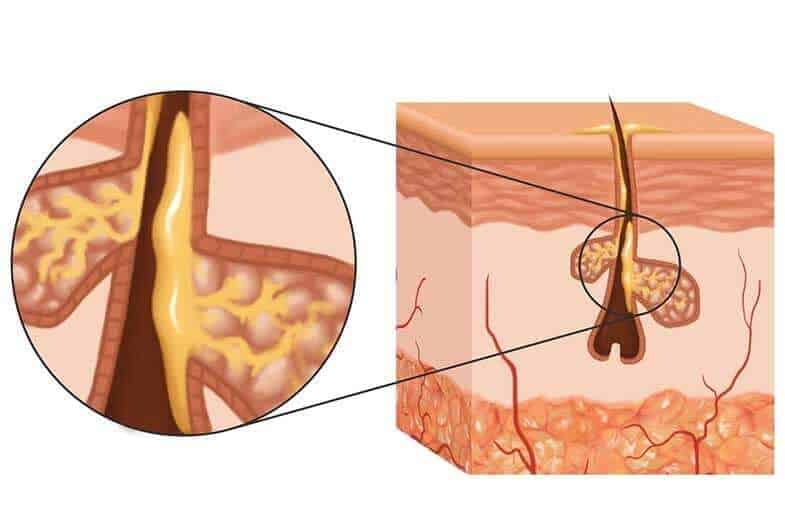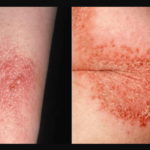For your skin to look healthy and retain its glow, it is essential for you to protect its natural oil. This is necessary to ensure that your skin functions at its best. In this article, I’ll explain what your skin’s natural oil is and its benefits.
What is your skin’s natural oil called? Your skin’s natural oil is called sebum. It can be described as an oily and light yellow substance that your sebaceous glands secrete. The goal of sebum is to moisturize not only your skin but also your hair.
Sebum also plays a major role in protecting and coating your skin. It consists of free fatty acids, triglycerides, squalene, wax esters, cholesterol, and cholesterol esters. It serves several functions for your skin, so it is necessary to get a good supply of it.
Continue reading this article to increase your knowledge about your skin’s natural oil, how it is produced, and how it can benefit you.
What Is Your Skin’s Natural Oil Called?
The natural oil found in your skin is called sebum, which your sebaceous glands tend to produce naturally. If you are unfamiliar with sebaceous glands, then take note that you can find them in almost all parts of your body, except on the soles of your feet and the palms of your hands.
You can find a huge amount of these glands in the genital area, the middle part of your back, and your face, especially your chin and forehead. A hair follicle tends to connect the majority of your sebaceous glands to your skin’s surface.
Your sebaceous glands are also responsible for the production of sebum, your skin’s natural oil. Each of these glands secretes sebum. You can view it as tear ducts secreting natural moisture in your eyes. Despite the fact that sebaceous glands are smaller compared to tear ducts, the way they work is the same.
Before sebum goes to your skin’s surface, though, it tends to combine with cells, particularly those that are on their way to being sloughed within your hair follicles. Upon filling up the follicle, sebum will start spreading over the skin surface, improving its health and adding moisture to it.
This is good for your skin, although there are cases when the sebum production is too much, causing excessively oily skin and hair. This can further result in a condition known as seborrhea. Healthy amounts of sebum in your skin, however, are good for you because this natural oil carries several benefits.
The below video shows a good visual display of sebum:
Major Benefits and Functions of Sebum

Sebum plays several functions. Upon making its way to your skin’s surface, this natural oil can help make your skin waterproof. It acts as a barrier by preventing excessive amounts of water from penetrating your body and ensuring that you do not lose too much water via your skin.
Aside from that, a good supply of sebum can keep your skin protected from fungal and bacterial infections. Other benefits and functions of sebum include:
Speeds up the tanning process – Your skin’s natural oil, called sebum, can help you tan faster compared to those skin types that seem to lack oil. It is because sebum production contributes to the entire tanning process. Your oily skin brought on by sebum production also helps in preserving the dark, tanned color for an extended period.
Protects your skin from harsh environmental elements – Sebum can also protect you from harsh environments. Some elements in the environment, like dust and the present weather, will have a difficult time penetrating your skin, especially on your face, if it produces enough sebum.
The harsh UV light will also take longer to reach the deepest layers of your skin. The fact that it can naturally moisturize your skin is also a big help in providing the best protection from the cold. This further protects you from a wide range of skincare issues that you might experience, especially during the winter season.
Makes you less prone to experience skin irritation – The environment you are in and your lifestyle both play crucial roles in your skin condition. Still, the right amount of natural oil or sebum in your skin will lower your risk of suffering from various kinds of skin irritation. You will less likely experience skin problems, such as psoriasis and eczema, often linked to excessive dryness of the skin.
Having sufficient amounts of sebum or natural oil in your skin will also prevent you from worrying too much about the level of humidity and central heating or air conditioning that might negatively affect your skin. You can prevent your skin from getting seriously dehydrated or dry, which prevents additional irritation.
Provides a good supply of Vitamin E – Another benefit of sebum is that it is rich in Vitamin E. This is a strong antioxidant capable of providing not only anti-inflammatory benefits but also protection against free radicals.
Apart from the mentioned benefits, sebum is also famous for moisturizing your skin. It tends to form a barrier on your skin’s surface to keep it hydrated and prevent the loss of water. The presence of sebum in your skin also helps it age slower. It is due to its antioxidant and moisturizing properties.
However, too much sebum production might also lead to negative side effects. For instance, hair follicles clogged with dead skin cells and sebum might cause the growth of bacteria that leads to acne. Clogged follicles also result in whiteheads or blackheads and excessive oiliness.
You can, however, regulate sebum production to just the right amount. It should be just enough to help you enjoy its favorable benefits. This is what I’ll cover next.
Ways to Regulate Sebum Production
While sebum can produce several benefits to your skin, take note that excessive amounts of it might also lead to negative side effects. Fortunately, there are ways to regulate its production, including the following:
Use a gentle cleanser – One effective tip to regulate or control the production of sebum is to wash your face using a gentle cleanser. This is the key to cleansing your skin properly. Make sure to use a non-comedogenic body or facial wash that is gentle on your skin. Avoid harsh soaps as much as possible as this might lead to the excessive production of oil.
You may want to use a basic cleanser devoid of oil instead. Another choice is one that contains glycolic acid, benzoyl peroxide, or salicylic acid. These are cleansing ingredients that also work in dissolving excess oils. Furthermore, they can remove dead skin cells and lessen acne-causing bacteria in your skin.
Apply an egg white mask – You can also create a skincare mask out of natural home remedies. One example is made of egg whites. Egg whites are effective in lessening oil production, so it helps to make it a part of your homemade mask. It can help soak excess oil in your skin.
To create this mask, mix one egg white and one teaspoon of honey. Add enough flour to create a paste out of the mixture. Apply this mask on any part of your face or body with excess oil. Leave it for around ten minutes, then use warm water to rinse it off.
Make some changes in your diet – Start eating healthy as this can aid in naturally reducing the production of sebum. Note that certain vitamins and minerals present in foods can naturally lessen the excessive oil in your body. Add in more fresh fruits and veggies to your diet to get a good supply of vital nutrients. Lower the number of processed foods you consume every day, too.
Stay away from sugar, dairy, and wheat as these might worsen sebum production. Cut them from your diet and find out if this move helps lessen your body’s oil production. To improve your skin health, you might also want to increase your intake of foods rich in Omega-3 fatty acids, particularly those present in fish.
Use argan oil to moisturize your skin – To regulate sebum and prevent excess production of it, you can seek the help of argan oil. Applying it to your skin can add moisture to it, balancing the production of natural oil. You may want to apply argan oil directly to your skin. Alternatively, you can use other skincare products containing it.
Create a turmeric scrub – Turmeric is also a huge help in reducing the number of natural oils that your sebaceous glands secrete. To use turmeric on your skin, just make a scrub out of it. Mix it with lemon juice, then pour some water until a scrub is produced. Apply it on areas with too much oil, especially the acne-prone parts. Leave it for fifteen minutes, then rinse using lukewarm water.
Conclusion – What Is Your Skin’s Natural Oil Called?
What is your skin’s natural oil called? Your skin’s natural oil is called sebum. Sebum offers a lot of favorable and rewarding benefits to your skin, including protecting and moisturizing it.
However, you also have to gain full control over sebum production to ensure that your sebaceous glands do not secrete too much of this natural oil. To regulate the production, try these tips:
- Use a gentle cleanser
- Apply an egg white mask
- Make some changes in your diet
- Use argan oil to moisturize your skin
- Create a turmeric scrub
By applying these tips, your sebaceous glands will be able to produce just enough natural oil to benefit your skin. This will let you benefit the most from your skin’s natural oil.


![How to Get Dead Skin Off Lips [6 Natural Remedies] how to get dead skin off lips](https://skincaregeeks.com/wp-content/uploads/2021/04/how-to-get-dead-skin-off-lips-150x150.jpg)

![Neutral Skin Tone Defined [and Best Colors for Neutral Skin] neutral skin tone](https://skincaregeeks.com/wp-content/uploads/2021/05/neutral-skin-tone-150x150.png)




